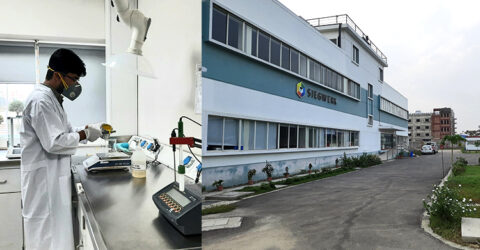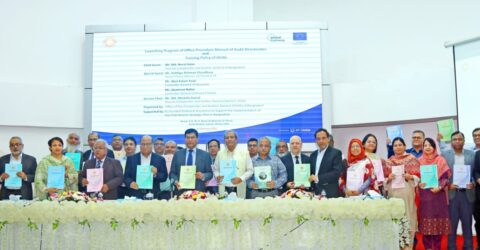Bangladesh’s success story can be an eye-opener for the rest of the world: Dr. Atiur Rahman
The Bangladesh The Bangladesh
Today

Eminent economist and former governor of
Bangladesh Bank Professor Dr Atiur Rahman believes that Bangladesh’s quantum
jump from a war-ravaged country to a role model of inclusive and sustainable
development can be an eye-opener for the rest of the world.
He said this yesterday while presenting the keynote paper at the seminar
titled “From Ashes to Prosperity: Bangladesh’s journey towards inclusive
growth” held at the Council Chamber of Redbridge Town Hall, London.
The event was organized jointly by the Mayor’s Office of London Borough of
Redbridge and the Centre for Upholding Spirit of Liberation War. Leader of
Council, London Borough of Redbridge- Councillor Jas Athwal Chaired the
session, while Redbridge Mayor- Councillor Thavathuray Jeyaranjan were
present as an esteemed guest, said a press release.
Among the esteemed speakers were- Saida Muna Tasneem (Bangladesh High
Commissioner to UK), Freedom Fighter Mahmud Hasan MBE (Chief Executive of
Apasen International), and Dr Selim Jahan (former Director of the Human
Development Report office of UNDP).
Current and former Council Members of Redbridge, academics, representatives
from charity organizations and other British-Bangladeshi dignitaries were
present at the event.
Saida Muna Tasneem welcomed the initiative of inviting Dr Atiur Rahman to
speak about Bangladesh’s amazing macroeconomic transformation within fifty
years of the country’s independence.
She added that the values of secularism, inclusiveness, equal rights, and
social justice have worked behind Bangladesh’s success as a country.
Mahmud Hasan, MBE, in his remarks, emphasized Bangladesh achievements in
terms of inclusive development and expressed the commitment of British-
Bangladeshis to work towards strengthening the bond between UK and
Bangladesh.
While presenting the keynote Dr Atiur Rahman began by pointing out that
Bangabadhu wanted not only political freedom for the people of Bangladesh,
but also their economic freedom.
“That is why under his aesthetic leadership Bangladesh was well on track of
inclusive development and within less than four years of the country’s
independence the per capita income almost tripled to $273,” he added.
Dr Atiur added that Bangladesh got derailed from this path in 1975 when
Bangabandhu was murdered. However, after much struggle, the country got back
on track under the prudent leadership of Bangabandhu’s daughter- the current
Prime Minister Sheikh Hasina.
He informed that Bangladesh’s per capita income has increased more than 7
times since 1975. And 73 percent of this increase has taken place within the
last 12-13 years under the leadership of the present Premier.
The former central bank Governor further pointed out that the benefits of
these macroeconomic achievements have reached the bottom of the social
pyramid as reflected in poverty reduction and other human development
indicators.
He emphasized Bangladesh’s macroeconomic potential in the medium-term and
inferred that following the macroeconomic trajectory of its Southeast Asian
peers, Bangladesh can also have USD 4,000+ per capita income by 2026.
However, Dr Atiur cautioned, Bangladesh will also have to overcome certain
hurdles in the way, e.g., managing the ‘dollar crisis’ arising from the
Ukraine-Russia war, safeguarding the population from inflation, managing the
fuel prices, recovering from the recent flood, creating employment,
bolstering domestic demand, and coping with the ongoing COVID-19 pandemic
fallouts.
Dr Selim Jahan highlighted the social resilience of Bangladesh along with its
tested gains in inclusion. Iqbal Ahmed suggested decentralized urbanization
to make Bangladesh growth process more sustainable.




